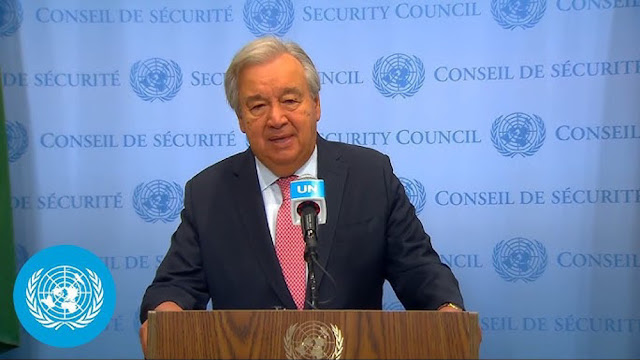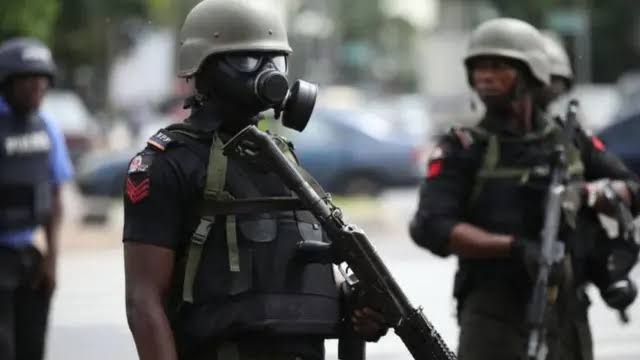In a somber and urgent address to journalists at the United Nations headquarters in New York on Thursday, August 28, 2025, Secretary-General Antonio Guterres delivered a stark warning about the escalating humanitarian crisis in Gaza. Describing the situation as “without parallel in recent times,” Guterres painted a grim picture of a region ravaged by systematic destruction, where civilians face starvation, displacement, and relentless violence. His remarks come amid Israel’s ongoing military operations in Gaza, which have intensified since October 2023, resulting in catastrophic consequences for the Palestinian population.
Guterres’ statement focused on the deliberate devastation of Gaza’s essential infrastructure, including its food, water, and healthcare systems, which has pushed the territory to the brink of famine. He condemned the escalating hostilities, particularly Israel’s military invasion of Gaza City, which he warned could displace hundreds of thousands of already traumatized civilians. The UN chief called for an immediate ceasefire, unfettered humanitarian access, and accountability for those responsible for what he described as “an endless catalogue of horrors.”
A Humanitarian Catastrophe Unfolding in Gaza
The Secretary-General’s remarks underscore the dire circumstances in Gaza, where nearly 62,900 Palestinians—predominantly women and children—have been killed since the onset of Israel’s military campaign in October 2023. The conflict, sparked by heightened tensions and retaliatory actions, has left Gaza’s infrastructure in ruins, with entire neighborhoods reduced to rubble. Hospitals, schools, and water treatment facilities have been targeted or damaged, severely limiting access to basic necessities.
Guterres highlighted the systematic nature of the destruction, noting that Gaza’s food, water, and healthcare systems have been deliberately undermined. “Gaza is piled with rubble, bodies, and potential violations of international law,” he said, emphasizing that the crisis is not a natural disaster but the result of calculated actions. The UN chief warned that famine, once considered a looming threat, is now a “present-day reality” for over half a million people in Gaza City alone. The collapse of food supply chains, coupled with restricted access to humanitarian aid, has left families struggling to survive.
The plight of Gaza’s civilians is compounded by repeated displacement. Guterres expressed alarm at Israel’s plans to intensify military operations in Gaza City, which could force hundreds of thousands of people to flee their homes once again. “Hundreds of thousands of civilians—already exhausted and traumatized—would be forced to flee once again, plunging families into even deeper peril. This must stop,” he declared. The constant displacement has created a cycle of suffering, with families unable to find safe refuge or access adequate shelter, food, or medical care.
Violations of International Law and Calls for Accountability
A central theme of Guterres’ address was the need for accountability for those responsible for the violence and destruction in Gaza. He characterized the ongoing conflict as part of “an endless catalogue of horrors,” pointing to potential violations of international humanitarian law. The targeting of civilian infrastructure, including hospitals and schools, and the starvation of civilians as a method of warfare are prohibited under the Geneva Conventions, which set out the legal framework for armed conflicts.
Guterres urged Israel, as the occupying power in Gaza, to fulfill its obligations under international law by ensuring the provision of essential supplies such as food, water, and medicine. He stressed that starvation must never be used as a weapon of war, a practice explicitly condemned under international humanitarian law. “Civilians must be protected, and humanitarian access must be unimpeded. No more excuses. No more obstacles. No more lies,” he said, delivering a powerful rebuke to those obstructing aid efforts.
The UN chief’s call for accountability resonates with growing international concern about the conduct of the conflict. Human rights organizations, including Amnesty International and Human Rights Watch, have documented alleged war crimes, including indiscriminate attacks on civilian areas and the use of disproportionate force. The International Criminal Court (ICC) has also been exploring potential investigations into actions by both Israeli and Palestinian actors, though progress has been slow due to political sensitivities.
Israel’s Military Operations and the Humanitarian Impact
Israel’s military campaign in Gaza, which intensified in October 2023, has been described by the Israeli government as a response to security threats emanating from the territory. The campaign has involved widespread airstrikes, ground incursions, and a blockade that has severely restricted the flow of goods and people into and out of Gaza. While Israel maintains that its actions are aimed at neutralizing militant groups, the scale of civilian casualties and infrastructure damage has drawn widespread condemnation.
Guterres specifically highlighted the planned escalation in Gaza City, warning that further military operations would exacerbate an already catastrophic situation. Gaza City, once a bustling hub of commerce and culture, has been devastated by months of bombardment. Entire neighborhoods have been leveled, and essential services such as electricity and clean water are scarce. The UN estimates that over 80% of Gaza’s 2.3 million residents have been displaced at least once since the conflict began, with many living in overcrowded shelters or makeshift camps.
The blockade imposed by Israel has further compounded the crisis, limiting the delivery of humanitarian aid to a fraction of what is needed. According to the UN Office for the Coordination of Humanitarian Affairs (OCHA), only a small percentage of aid trucks are allowed to enter Gaza each day, far below the pre-conflict average. This has led to critical shortages of food, medicine, and fuel, with hospitals forced to operate without adequate supplies or electricity. The World Health Organization (WHO) has reported that Gaza’s healthcare system is on the verge of collapse, with many facilities damaged or inoperable.
The Broader Context: A History of Conflict
The current crisis in Gaza is part of a decades-long conflict between Israel and the Palestinians, rooted in competing claims to land and self-determination. Gaza, a narrow strip of land along the Mediterranean coast, has been under Israeli blockade since 2007, following the takeover of the territory by Hamas, a Palestinian militant group. The blockade, combined with periodic military operations, has left Gaza’s economy and infrastructure in tatters, with unemployment rates exceeding 50% and widespread poverty.
Previous rounds of violence, including major conflicts in 2008-2009, 2012, 2014, and 2021, have caused significant loss of life and destruction. Each conflict has further eroded Gaza’s ability to recover, creating a cycle of poverty, displacement, and despair. The current escalation, described by Guterres as unprecedented in its intensity, has pushed Gaza to a breaking point, with long-term consequences for the region’s stability and the prospects for peace.
The international community’s response to the conflict has been marked by division. While some countries, including the United States and several European nations, have expressed support for Israel’s right to defend itself, others have condemned the disproportionate impact on Palestinian civilians. The UN, through agencies like UNRWA (the United Nations Relief and Works Agency for Palestine Refugees), has been a primary provider of humanitarian aid in Gaza, but its efforts have been hampered by funding shortages and restrictions on access.
Guterres’ Call for Action: Ceasefire and Humanitarian Access
At the heart of Guterres’ address was a renewed call for an immediate and permanent ceasefire, the unconditional release of all hostages, and unfettered humanitarian access to Gaza. These demands reflect the UN’s longstanding position on the conflict, which emphasizes the protection of civilians, adherence to international law, and the pursuit of a negotiated resolution. Guterres’ appeal for a ceasefire comes amid stalled diplomatic efforts to broker a truce, with previous mediation attempts by Egypt, Qatar, and the United States failing to yield lasting results.
The release of hostages, including those taken during the initial stages of the conflict in October 2023, remains a contentious issue. Hamas has demanded the release of Palestinian prisoners held in Israeli jails as part of any deal, while Israel insists on the unconditional return of its citizens. The complexity of these negotiations, coupled with ongoing military operations, has made progress elusive.
Guterres’ emphasis on humanitarian access underscores the urgent need to alleviate the suffering of Gaza’s civilians. The UN has called for the opening of additional border crossings, including the Rafah crossing with Egypt and the Kerem Shalom crossing with Israel, to facilitate the delivery of aid. The Secretary-General also stressed the importance of protecting civilian infrastructure, such as hospitals, schools, and water facilities, which are critical to sustaining life in Gaza.
The Role of the International Community
The crisis in Gaza has exposed the limitations of the international community’s ability to respond effectively to humanitarian emergencies. While the UN and its agencies have been vocal in advocating for Gaza’s civilians, their efforts have been constrained by political divisions among member states and logistical challenges on the ground. The Security Council, tasked with maintaining international peace and security, has been unable to adopt a unified stance on the conflict, with veto-wielding powers like the United States often blocking resolutions critical of Israel.
Guterres’ remarks also serve as a call to action for global leaders to prioritize the protection of civilians and uphold international humanitarian law. The starvation of civilians, he warned, is not only a moral outrage but a violation of fundamental principles that underpin the global order. By framing the crisis in Gaza as a test of the international community’s commitment to human rights, Guterres is urging governments, civil society, and individuals to take concrete steps to address the suffering.
Humanitarian organizations have echoed Guterres’ concerns, calling for increased funding and access to support Gaza’s population. UNRWA, which provides essential services to Palestinian refugees, has appealed for $1.2 billion to meet urgent needs in 2025, but donor fatigue and competing global crises have strained its resources. The broader challenge lies in balancing immediate relief efforts with long-term strategies to address the root causes of the conflict, including occupation, blockade, and political stalemate.
The Path Forward: Challenges and Hope
The road to resolving the crisis in Gaza is fraught with challenges, but Guterres’ address offers a glimmer of hope by reaffirming the UN’s commitment to advocating for peace and justice. An immediate ceasefire would provide a critical window to deliver aid, rebuild infrastructure, and begin the process of healing for Gaza’s traumatized population. However, achieving a lasting resolution requires addressing the underlying issues of occupation, inequality, and political exclusion that have fueled the conflict for decades.
The international community must also grapple with the question of accountability. Guterres’ call for those responsible for violations of international law to be held accountable is a reminder that impunity undermines the prospects for peace. Whether through the ICC, national courts, or other mechanisms, ensuring justice for victims could help break the cycle of violence and rebuild trust between communities.
For the people of Gaza, the immediate priority is survival. The images of families searching for food amidst rubble, children receiving treatment in damaged hospitals, and displaced communities living in tents have become symbols of a humanitarian catastrophe that demands urgent action. Guterres’ warning that “no more excuses” will be tolerated is a challenge to the world to act decisively and compassionately.
Conclusion
UN Secretary-General Antonio Guterres’ impassioned address on the crisis in Gaza is a sobering reminder of the human cost of conflict and the urgent need for action. By highlighting the systematic destruction of Gaza’s infrastructure, the starvation of civilians, and the potential violations of international law, Guterres has brought renewed attention to a crisis that has claimed nearly 62,900 lives and displaced millions. His call for an immediate ceasefire, humanitarian access, and accountability reflects the UN’s commitment to protecting the most vulnerable and upholding the principles of justice and humanity.
As Gaza teeters on the edge of famine and further violence looms, the international community faces a critical test. The suffering of Gaza’s civilians cannot be ignored, and the world must rally to provide aid, protect civilian lives, and work toward a just and lasting resolution. Guterres’ words serve as both a warning and a plea: the time for excuses is over, and the time for action is now.






